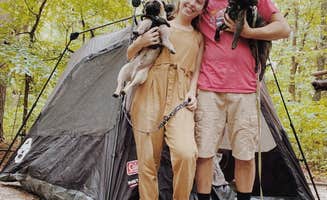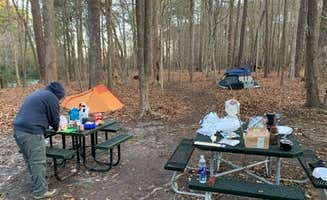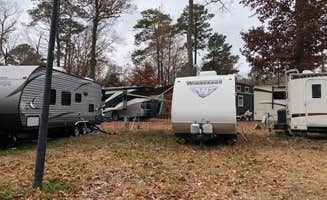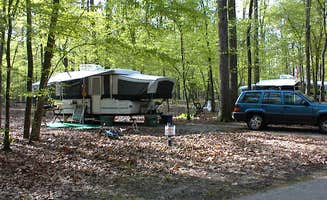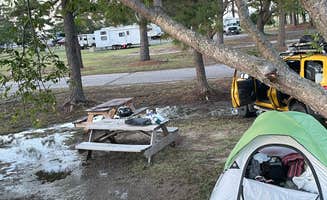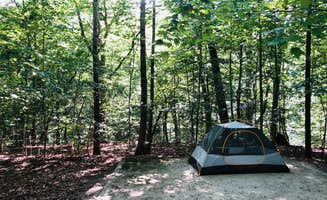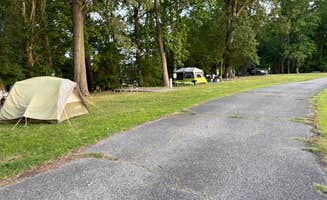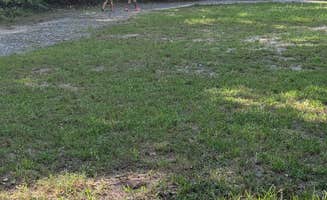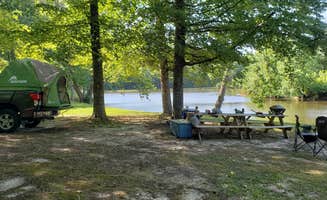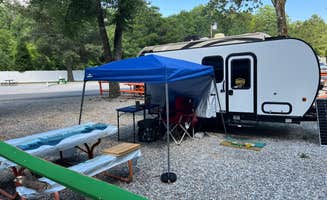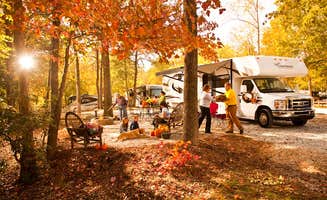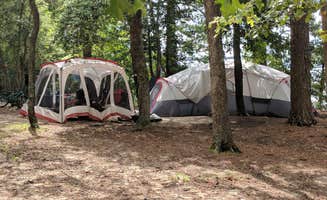Newport News Park Campground sits just 8 miles from the city, offering a heavily wooded camping experience with varying site elevations. The park features over 188 sites across multiple loops, many with water and electric hookups. During summer months, temperatures in this coastal Virginia region typically range from 75-90°F with moderate humidity, making spring and fall the more comfortable camping seasons.
What to do
Explore hiking trails: Newport News Park contains miles of nature trails winding through wooded areas and around the reservoir. "[The park has] miles of trailes and plenty of wildlife with a few historical sites," notes one camper at Newport News Park.
Visit historic Fort Monroe: Located at The Colonies RV and Travel Park, this historic site offers educational opportunities about coastal Virginia history. A visitor mentions it's "a wonderful spot for a campground on the Historic Fort Monroe. There is no gate to have to pass through to reach the campground."
Go fishing or boating: Sandy Bottom Nature Park provides excellent water activities. As one reviewer states, "To kayak here it's the bomb!" The park offers boat rentals for those without their own equipment.
Try beach activities: First Landing State Park offers beach access with relatively calm waters. "The beach is more secluded and you're close to all the activities that Virginia Beach has to offer," according to a camper.
What campers like
Spacious campsites: Many campgrounds offer good site separation. At Chippokes State Park, "The sites are close but not on top of each other. We have an RV but there are cabins and tent sites."
Water views: Several campgrounds feature waterfront locations. The Colonies RV Park is "located on a peninsula with beautiful bay and creek views. You can enjoy both the sunrise and sunset," as one camper describes.
Natural surroundings: Most campsites maintain substantial tree cover. At Newport News Park, sites are "quiet, very spacious, nicely spaced, some surprisingly so, but many are deceptively unlevel, particularly on the outside of the loops, and are heavily wooded."
Abundant wildlife: Local parks support diverse wildlife viewing opportunities. A visitor to Chippokes State Park notes, "Wild animals usually pass by often later in the evening, horses, deer, rabbits etc."
What you should know
Train noise: Some campgrounds experience railroad disruptions. At Anvil Campground, "The train that passes by is great for kids and you barely notice it," though opinions vary as another camper notes trains are "all day and night- earth shakes and extremely loud."
Unlevel sites: Many campsites require leveling equipment. At Kiptopeke State Park, "1st row not very level sites. Not quite as spacious/spread out sites as other state parks, but it's on the bay!"
Summer heat: The region gets hot and humid in peak summer. One camper at First Landing warns, "I wouldn't recommend tent camping in the middle of summer - my husband and i both got sick."
Military presence: Some campgrounds are near military installations. First Landing campers note, "You may hear occasional machine guns and artillery. You will also hear reveille in the morning."
Tips for camping with families
Look for playgrounds: Several camping areas offer play equipment. At The Colonies RV and Travel Park, "There is a little beach down from our site and our dogs enjoyed their first dip in the bay."
Consider pool access: Swimming options vary by location. Williamsburg Campground features "a pool with a sprayground and a grassy area with ping pong and corn hole. Plus, they always have activities for the kids."
Check for organized activities: Some parks offer planned family events. A visitor to Williamsburg Campground mentions they have "planned activities like Petting zoo, hayrides, and movie night."
Seek natural exploration: Many parks offer educational nature opportunities. Sandy Bottom Nature Park is described as "a beautiful 456 acre education and wildlife facility. Born from garbage dumps and it is great example of what can be achieved."
Tips from RVers
Bring leveling equipment: Many sites require additional leveling. At Bethel Park, "Large sites that are easy to get in and out of. It each site has a grill, picnic table and a fire ring. A couple of the sites have some drainage issues, but only after repeated heavy rains."
Check hookup availability: Hookups vary widely between campgrounds and loops. At Newport News Park, "Some loops are primitive, some have only 20A service and some have 30A service and water hookup. There are no sewer hookups, but there is a dump station."
Plan for utilities: Bring appropriate supplies for your site's hookups. At Newport News Park, "You need at least a 25' hose" for water connections at some sites.
Consider site location: Some sections offer more privacy or amenities. At Kiptopeke State Park, campers recommend "C loop spots 15 - 21. They're shaded and at the back of the loop."


